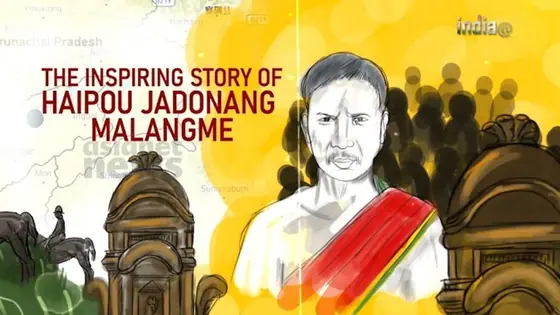
India@75: Inspiring story of Haipou Jadonang Malangmei, the legendary Naga leader
India's North-Eastern provinces' signal role in the country's freedom struggle has not been duly recognised. The region's various tribes have a hoary history of resistance against the British.
India's North-Eastern provinces' signal role in the country's freedom struggle has not been duly recognised. The region's various tribes have a hoary history of resistance against the British. The inspiring story of the legendary Naga leader Haipou Jadolang Malangme is one of them.

Jadolang was born in 1905 in Manipur's Rongmei Naga tribe of the Zeliangrong community in the Kambiran village. He was the first of the North Eastern tribes to wage a lifelong war against the cultural and political invasion of the British.
Also watch: India@75: Backward castes who fought for Independence
He began his movement by forming a sociopolitical organisation in his community named Heraka. It fought against unfair practices like animal sacrifice within its tribe and foreign missionaries' attempts to convert them to Christianity with the help of British officials.
As the Naga king became a vassal of the British, Jadonang proclaimed himself to be the Naga Messiah King. Jadonang organised Riphen, an armed group of Naga youths, among whom was his cousin Rani Gaidinliu who later rose to be one of the region's greatest leaders.
Dressed like the British to hide his identity, he travelled through the region on horseback, organising the Zelinagrong community. One day the British agent R C Duncan stopped him and ordered to take off his dress and get down from the horse. When he refused, he was taken into custody.
Also watch: India@75: The unknown story of women freedom fighters from Assam
He was excited by the civil disobedience struggle launched by Mahatma Gandhi. Once, he travelled to Silchar with 200 Naga youths to meet Gandhi. But the meeting did not take place as Gandhi had cancelled his trip. Jadonang submitted a memorandum to the Simon Commission demanding an independent Naga country.
Jadonang's arrest enraged the Nagas. They launched attacks on British outposts. After his release, Jadonang called for a final assault on the invaders. Arms began to be collected, and attacks were launched. The British Assam Rifles unleashed a fierce assault at Jadonang's village Puilian killing hundreds and demolishing homes and temples. Jadolang was arrested on 19 February 1931 along with hundreds of followers, including Rani Gaidinliu.
Jadonang was hanged to death on 29 August on the banks of the Nambul river behind the Imphal jail.
Also watch: India@75: Group of revolutionary women who took arms against the British empire